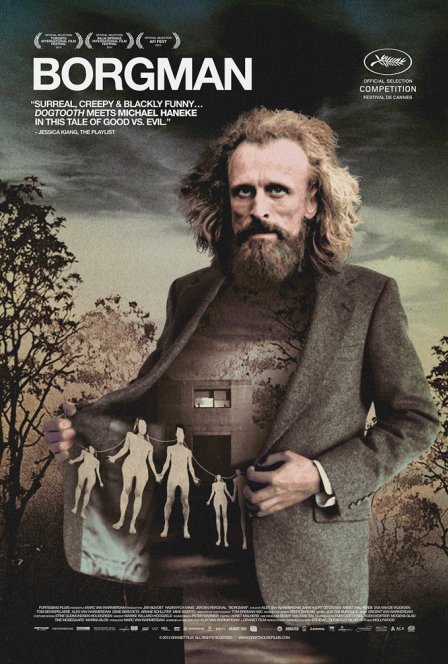Sleeper cells of malevolent people are living underground in the forest. A priest leads a mission to root them out, but they scamper off like rats, just in time. Dutch director Alex van Warmerdam’s opening sequence climaxes with the collapse of a large expanse of earth, followed by graphic-novel-style billowing white smoke, released by the underground leader, Borgman (Jan Bijvoet), to cover his tracks.
Borgman knocks on the door of an isolated, sprawling modern home in a nearby wealthy neighborhood, asking to take a shower, and gets turned down matter-of-factly by Richard (Jeroen Perceval), the man of the house. But Borgman senses a weak spot, or just makes a lucky guess: through the closed door he calls out, “I know your wife.” Richard’s wife, Marina (Hadewych Minis), denies knowing him, but Borgman’s words hone in on a fissure in the couple’s mutual trust, setting in motion a kind of infection; Richard beats him savagely, then physically shoves Marina back into the house and angrily questions her. Borgman has his hook: he plays on Marina’s guilt and pity to secretly let him recover in the guesthouse.
Borgman soon arouses feelings in Marina, and once he has a foothold he chillingly announces, “I’m bored. I want to play.” He gets to work insinuating himself and his comrades into the fabric of the family. Van Warmerdam creates a visual representation of how demons prey on the fears and doubts in the human psyche, how paranoid fantasies can spin out into actual physical destruction. Borgman’s posse has a practice of plunging their victims headfirst into buckets of cement and dropping them upside down to the bottom of a lake, where their limbs sway with the current. It’s a lovely, macabre image that suggests humans turned into seaweed by the weight of what’s in their minds.
Adding to Richard and Marina’s vulnerability is the fundamental contradiction of trying to enjoy their privileged life without a bad conscience. “We have it so good. We are so fortunate. And the fortunate must be punished,” Marina says, in tears. “We were born in the West, and the West happens to be affluent,” Richard rationalizes. “We can’t help it.” It’s a weak argument, and by this point Borgman is already moving forward. Not that the film is advocating any kind of social justice; if anything it’s showing Marina’s guilt — the distance between her belief system and the way she lives — as a weakness that inevitably gets discovered and exploited.
Borgman himself is a fascinating character, quietly self-assured, with soulful eyes that express sublimated pain; he seems like a once-gentle spirit whose manner has stayed the same while his intentions have turned deadly. He kills without remorse, generally by using poison, but he seems to operate under a code that requires his victims to be complicit in their own death.
Borgman has been described as a dark comedy, maybe because of Richard’s and — especially — Marina’s fevered reactions to the escalating havoc in their lives, but it’s more of a straight up horror film, delving into the entrails of suffering in a way that can’t easily be laughed off. In fact, the story could be read as Marina’s nightmare: there’s a recurring image of Borgman as an incubus, crouching naked over her as she sleeps, and Marina’s developing madness is at the core of the narrative.
The film has been compared to the work of Michael Haneke, and van Warmerdam does have a similar proclivity to show cold-blooded brutality in a shockingly direct way. But whereas Haneke characteristically works with narrative negative space, inviting the audience to speculate on the very core of what they’ve seen, van Warmerdam’s film, though it includes fantastical/unexplained elements, is a tightly constructed mechanism that delights in the craft and precision of Borgman and his cohorts as they progress toward a clear and specific goal. Haneke plays conceptual games using naturalistic scenes as his building blocks; Van Warmerdam creates a heightened reality to tell a story that unfolds organically, cruel as nature. In that sense there’s a fleshed out, inked in parallel to the dream space narrative of Upstream Color.
The film’s visual style complements the low-key, relentless machinations of Borgman and his clan, the camera gliding coolly in widescreen across the clean geometries of Richard and Marina’s house. The clan’s instinct is to dig, and their efforts to burrow into the family members’ minds are spectacularly mirrored by their violent excavation and destruction of the garden surrounding the house.
Borgman isn’t necessarily an easy film to watch: the final outcome is easy to imagine, and while Richard and Marina aren’t exactly sympathetic characters — Richard in particular comes across as a childish, hot-headed yuppie — witnessing their slow demise as they walk into a series of traps is, for better or for worse, horrifying. But it’s an ambitious, brilliantly conceived piece, full of striking images that hang around in your thoughts afterwards. The final sequence suggests no less than the fall of the capitalist system, and not for the better.

